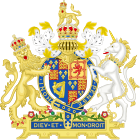| Act of Parliament | |
 | |
| Long title | An Act for the Regulating the Privie Councell and for taking away the Court commonly called the Star Chamber.[2] |
|---|---|
| Citation | 16 Cha. 1. c. 10 |
| Dates | |
| Royal assent | 5 July 1641 |
| Other legislation | |
| Amended by | |
| Repealed by | Justices of the Peace Act 1968 |
Status: Repealed | |
| Text of statute as originally enacted | |
The Habeas Corpus Act 1640 (16 Cha. 1. c. 10) was an Act of the Parliament of England.
The Act was passed by the Long Parliament shortly after the impeachment and execution of Thomas Wentworth, 1st Earl of Strafford in 1641 and before the English Civil War. It abolished the Star Chamber.[3] It also declared that anyone imprisoned by order of the king, privy council, or any councillor could apply for a writ of habeas corpus, required that all returns to the writ "certify the true cause" of imprisonment,[4] and clarified that the Court of Common Pleas also had jurisdiction to issue the writ in such cases (prior to which it was argued that only the King's Bench could issue the writ).[5]
The writ was amended by the Habeas Corpus Act 1679.
The words of commencement were repealed by section 1 of, and Schedule 1 to, the Statute Law Revision Act 1948.
The whole Act, so far as not otherwise repealed, was repealed in England by section 8(2) of, and Part I of Schedule 5 to, the Justices of the Peace Act 1968.
- ^ The citation of this Act by this short title was authorised by section 5 of, and Schedule 2 to, the Statute Law Revision Act 1948. Due to the repeal of those provisions, it is now authorised by section 19(2) of the Interpretation Act 1978.
- ^ These words are printed against this Act in the second column of Schedule 2 to the Statute Law Revision Act 1948, which is headed "Title".
- ^ 'Book 1, Ch. 11: Charles I', A New History of London: Including Westminster and Southwark (1773) pp. 154-74. Retrieved 6 March 2007.
- ^ Paul Halliday, Habeas Corpus: From England to Empire (Cambridge: Belknap Press of Harvard University Press, 2010), 224–26.
- ^ R. J. Sharpe, The Law of Habeas Corpus (Oxford: Clarendon Press, 1989), 18.